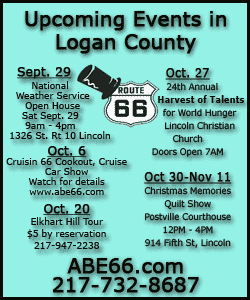 Julie M. Fenster, author of "The Case of Abraham Lincoln: A Story of
Adultery, Murder and the Making of a Great President," will be in
Springfield for a book discussion followed by a book signing Oct.
30, beginning at 7 p.m., in the Abraham Lincoln Presidential
Museum's Union Theater. The event is free and open to the public.
Reservations must be made by calling 217-558-8934. Julie M. Fenster, author of "The Case of Abraham Lincoln: A Story of
Adultery, Murder and the Making of a Great President," will be in
Springfield for a book discussion followed by a book signing Oct.
30, beginning at 7 p.m., in the Abraham Lincoln Presidential
Museum's Union Theater. The event is free and open to the public.
Reservations must be made by calling 217-558-8934.
The book, with a foreword by Douglas Brinkley, examines a May
1856 murder case that divided Springfield. A respected Springfield
blacksmith named George Anderson was found bludgeoned to death after
having endured weeks of strychnine poisoning. His wife and his
nephew, suspected of a sexual affair, were charged with the murder.
Although to many it seemed straightforward, the Anderson murder
trial polarized the city of Springfield during much of 1856. Those
siding with the prosecution also felt that their district attorney
wasn't doing enough to bring the simple case to a close. Because
Mrs. Anderson had been arrested and released twice, others felt that
he was hounding the defendants with insufficient evidence.

"In the charged atmosphere of Springfield and in the contentious
year of 1856, the Anderson case had become another arena, a way to
take sides," Fenster writes. "Inevitably, the contest spilled over
into politics." Finally, the grand jury indicted both Anderson and
her nephew. Before People v. Anderson and Anderson could begin,
though, the DA lost his party's endorsement in the primary.
With the general election looming in November, the lame duck
district attorney was given his choice of an "assistant" counsel in
prosecuting the murder case. He offered the position to his friend
Abraham Lincoln, who surprisingly announced that he believed Mrs.
Anderson and her nephew were innocent. Stunning the prosecutor and
the community, Lincoln instead joined the defense team at the 11th
hour.
[to top of second column]
 |
 The turning point in the salacious trial came when Lincoln
blocked testimony that alleged an affair between the defendants. "As
a legal maneuver, keeping that testimony out of the trial was
decisive -- the type of bold, yet basic tactic that reflected
Lincoln's work in court," Fenster writes. "Since adultery was itself
against the law in Illinois, allowing questioning on the potentially
illegal relationship between Theodore and Mrs. Anderson could have
been interpreted as trying them for a crime with which they were not
charged. Lincoln changed the trial by drawing that line." The
defendants were acquitted.
The mystery of who killed George Anderson was never solved. But
the trial's star attorney began cutting back on his court
appearances and delivering an average of two political speeches per
week, and the Republicans went on to stunning success in the
elections. In a book that draws a picture of Lincoln in court and at
home during that memorable season of 1856, Fenster also offers a
close-up look at Lincoln's political work -- much of it masterful,
some of it adventurous -- in building the party that would change
his fate, and that of the nation.
Julie Fenster is an award-winning author and historian,
specializing in 19th-century life. She is the co-author, with
Douglas Brinkley, of The New York Times best-seller "Parish Priest."
Her other books include "Ether Day" and "Race of the Century." She
was a regular contributor to American Heritage and has also written
for The New York Times and the Los Angeles Times.
[Text
from Abraham Lincoln Presidential
Library and Museum news release received from the
Illinois Office of Communication and Information]
 |